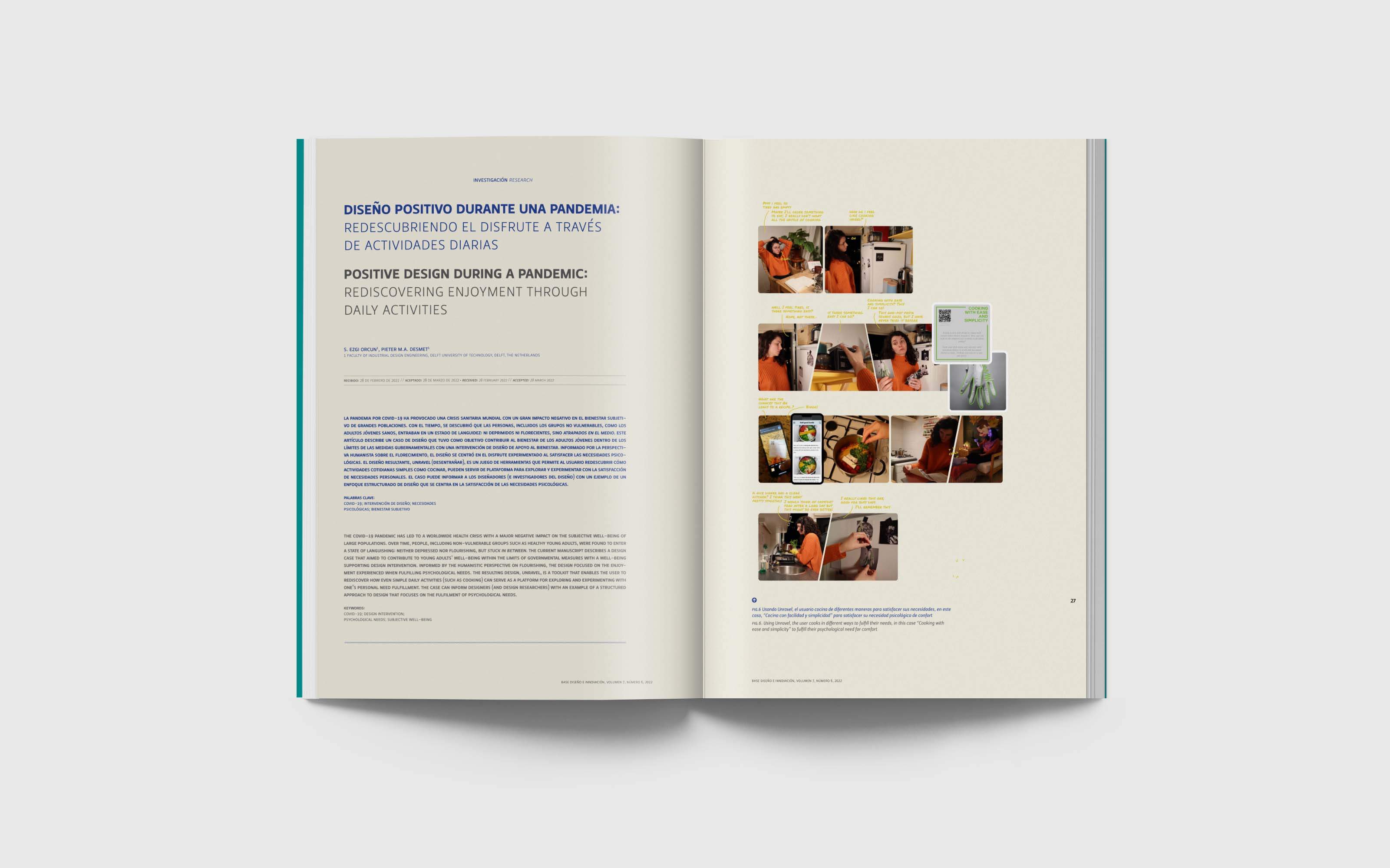Positive design during a pandemic Rediscovering enjoyment through daily activities
Main Article Content
Abstract
The COVID-19 pandemic has led to a worldwide health crisis with a major negative impact on the subjective well-being of large populations. Over time, people, including non-vulnerable groups such as healthy young adults, were found to enter a state of languishing: neither depressed nor flourishing, but ‘stuck in between’. The current manuscript describes a design case that aimed to contribute to young adults’ well-being within the limits of governmental measures with a well-being supporting design intervention. Informed by the humanistic perspective on flourishing, the design focused on the enjoyment experienced when fulfilling psychological needs. The resulting design, “Unravel”, is a toolkit that enables the user to rediscover how even simple daily activities (such as cooking) can serve as a platform for exploring and experimenting with one’s personal need fulfillment. The case can inform designers (and design researchers) with an example of a structured approach to design that focuses on the fulfilment of psychological needs.
Article Details
References
Berg, J. (2021, 21 May). Younger Americans more likely to be languishing than older Americans. Ipsos U.S. Mental Health 2021 Report. Retrieved from https://www.ipsos.com/en-us/news-polls/ipsos-us-mental-health-2021-report
Desmet, P., & Fokkinga, S. (2020). Beyond Maslow’s pyramid: introducing a typology of thirteen fundamental needs for human-centered design. Multimodal Technologies and Interaction, 4(3), 38. https://doi.org/10.3390/mti4030038
Grant, A. (2021, May 5). There’s a Name for the Blah You’re Feeling: It’s Called Languishing. The New York Times. https://www.nytimes.com/2021/04/19/well/mind/covid-mental-health-languishing.html
Keyes, C. L. (2002). The Mental Health Continuum: From Languishing to Flourishing in Life. Journal of Health and Social Behavior, 43(2), 207–222. https://doi.org/10.2307/3090197.
Keyes, C. L. M. (2003). Complete mental health: An agenda for the 21st century. In C. L. M. Keyes & J. Haidt (Eds.), Flourishing: Positive psychology and the life well-lived (pp. 293–312). American Psychological Association. https://doi.org/10.1037/10594-013
Lyubomirsky, S., Sheldon, K. M., & Schkade, D. (2005). Pursuing Happiness: The Architecture of Sustainable Change. Review of General Psychology, 9(2), 111–131. https://doi.org/10.1037/1089-2680.9.2.111
Mascherini G, Catelan D, Pellegrini-Giampietro DE, Petri C, Scaletti C, Gulisano M (2021) Changes in physical activity levels, eating habits and psychological well-being during the Italian COVID-19 pandemic lockdown: Impact of socio-demographic factors on the Florentine academic population. PLoS ONE 16(5): e0252395. https://doi.org/10.1371/journal.pone.0252395
Maslow, A.H. (1987). Motivation and Personality, 3rd ed. Longman.
Orçun, E. (2021). Designing for Well-being in the context of Covid-19: Converting daily activities into [un]conscious pursuits of joy (Master Thesis). Delft: Technische Universiteit Delft.
Ruiz-Frutos, C., Ortega-Moreno, M., Allande-Cussó, R., Domínguez-Salas, S., Dias, A., & Gómez-Salgado, J. (2021). Health-related factors of psychological distress during the COVID-19 pandemic among non-health workers in Spain. Safety Science, 133, 104996. https://doi.org/10.1016/j.ssci.2020.104996
Sheldon, K. M., Elliot, A. J., Kim, Y., & Kasser, T. (2001). What is satisfying about satisfying events? Testing 10 candidate psychological needs. Journal of Personality and Social Psychology, 80(2), 325–339. https://doi.org/10.1037/0022-3514.80.2.325
Tay, L. & Diener, E. (2011). Needs and subjective well-being around the world. Journal of personality and social psychology, 101(2), 354–365.


